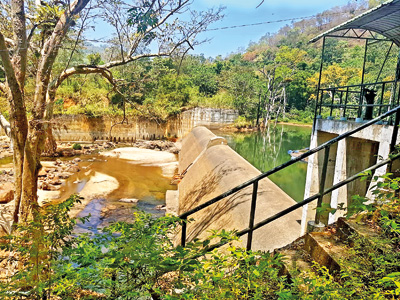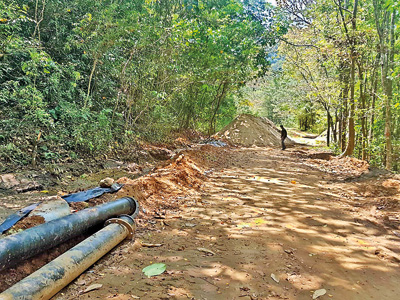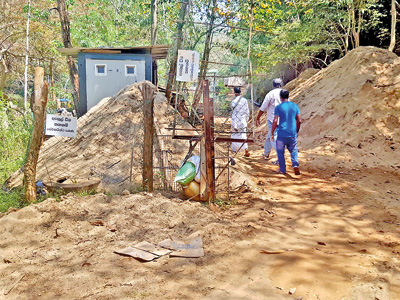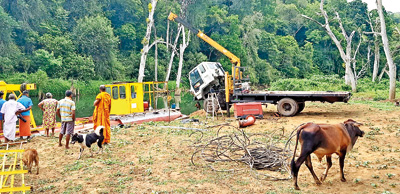News
Weli Oya anicut sand mining in the spotlight again

With elections over locals fear that sand pumping will resume again
Environmentalists and locals have been engaging in protests against a sand removal project from the Weli Oya anicut gates that started in 2017.
In the most recent line of protesting, local stakeholders brought up the matter with President Gotabaya Rajapaksa during his visit to the area. The project has since been stalled until further investigations are done.
“The Thanamalwila area was extremely dry and rural,” said a source from the Moneragala District Irrigation Department office. An anicut was built over the Weli Oya in an attempt to redirect water from the stream into paddy fields for better irrigation. The anicut has two gates that act as a hedge to raise the water level, and sediment has collected at the gates over time.
This affects the flow of the water, officials say. The Weli Oya nourishes over 30 other water tanks in the surrounding areas, and the anicut provides irrigation for 2,600 acres of paddy fields. The construction of the anicut provides enough water for farmlands to engage in three consecutive seasons of farming, and transports water to 1,500 farming families. “We have to provide water continuously and this makes anicut maintenance very difficult,” Irrigation Department officials said. Allowing water levels to rise naturally and flush away collected sediment at the anicut gates wasn’t an option. The only appropriate time for this would be during the October-November monsoon period. However, due to the extra harvest season that farmers in the area engage in, officials are required to provide irrigation to the paddy field from the first week of October. “So, there is no time to allow the water to collect.” The building of the anicut was a project completed in 2007 by the Irrigation Department. The source from the Irrigation Department office in Monaragala, an expert in his field, maintains that the building of the anicut and the sand deposit removal project have been advantageous to the community as a whole.
The contract for the extraction of sand was given to a private organisation, “Dredging Lanka Pvt Ltd” by the Geological Survey and Mines Bureau. Bestowed under heavy stipulation, the company’s adherence to the conditions provided in the contract falls under the purview of the Irrigation Department. 
Locals strongly disagree with the viewpoints expressed by the officials. N G Wimalaratna, Chairman of the Sand Association, stated that the local community has written to every government institute and individual of authority that should take action. The anicut gates were closed by the Irrigation Department in 2015 and locals hold the view that this was done in order to artificially create a blockage that would then require invasive removal. He believes that at least 5,000 cubes of sand have been extracted so far. The sand that previously flowed along the Weli Oya provided 1,000 people with the sediment for their sand mining activities. These sand “ports” have since shut down due to the artificial blockage. The conditions of the contract only give the company permission to mine 20% of the sand deposits at the anicut gate. This was in severe breach, noted many locals and environmentalists as at least 100 meters of the sand has been cleared.
The contract also allowed the company to engage in its mining activities for a period of one year starting July 3, 2017. However, the continued mining activities denote that this was in breach too. W L P Chaturanga, another local at the forefront of the battle against the project, noted that many other clauses in the contract were in severe breach too as only digging that would go 12 feet deep was permitted. However, the company has dug at least 40 feet deep so far, he said. Mr Chaturanga also noted that a sand cube sells for about Rs 10,000 on the market. The company purchases these sand cubes from the Irrigation Department at an extremely low price of Rs 150. Mr Wimalaratna recalled that at the initial building of the anicut the Minister in charge of the Irrigation Department at that time had promised canals for 200 acres of paddy. “Nothing has happened yet and the current Irrigation Department management is saying that the yield from the fields won’t justify the expense that would be incurred. This promise was made by the minister at the time in order to justify the diversion of the water that the anicut would cause. With no water flowing down the stream’s natural route locals in the area are facing a water deficiency. “The Weli Oya encompasses three districts, and farming communities in the areas also vehemently disagree with the sand mining and the closure of the anicut gate,” Mr Wimalarathna noted. Locals believe that no one except the private company and certain individuals in the Irrigation Department benefit from this. The Centre for Environmental Justice and community stakeholders also noted that environmental damage was being done to these areas, all reserved forest land.
A regional forest officer of the Haputale Forest Department range office told the Sunday Times that jurisdiction over the Weli Oya belonged to the Irrigation Department exclusively even though it was inside reserved forest land belonging to the Forest Department. The necessary approvals from the relevant government organisations had been obtained by the Irrigation Department prior to the inception of its activities, including approval from the Central Environmental Authority. The only destruction to forest land noticed so far by the range officers was the breaking down of boulder rocks that were in the way of transportation of the sand. Range Officers had reported this violation to the appropriate authorities. Action taken about this is inconclusive.
Moneragala District Secretary, Gunadasa Samarasinghe noted that the Geological Survey and Mines Bureau and the Irrigation Department had received explicit orders to suspend further mining activities by the President. The provision of sand mining permits in the area have also been suspended until further notice save for a residual of 200 cubes of sand for the Geological Survey and Mines Bureau. Mr Gunadasa, who has been in office for four months now, stated that electoral duties had diverted District Secretariat resources temporarily from the issue. However, he assured that investigations would continue before any further permission was granted.
Locals fear now that elections are over, that the sand pumping will resume.



